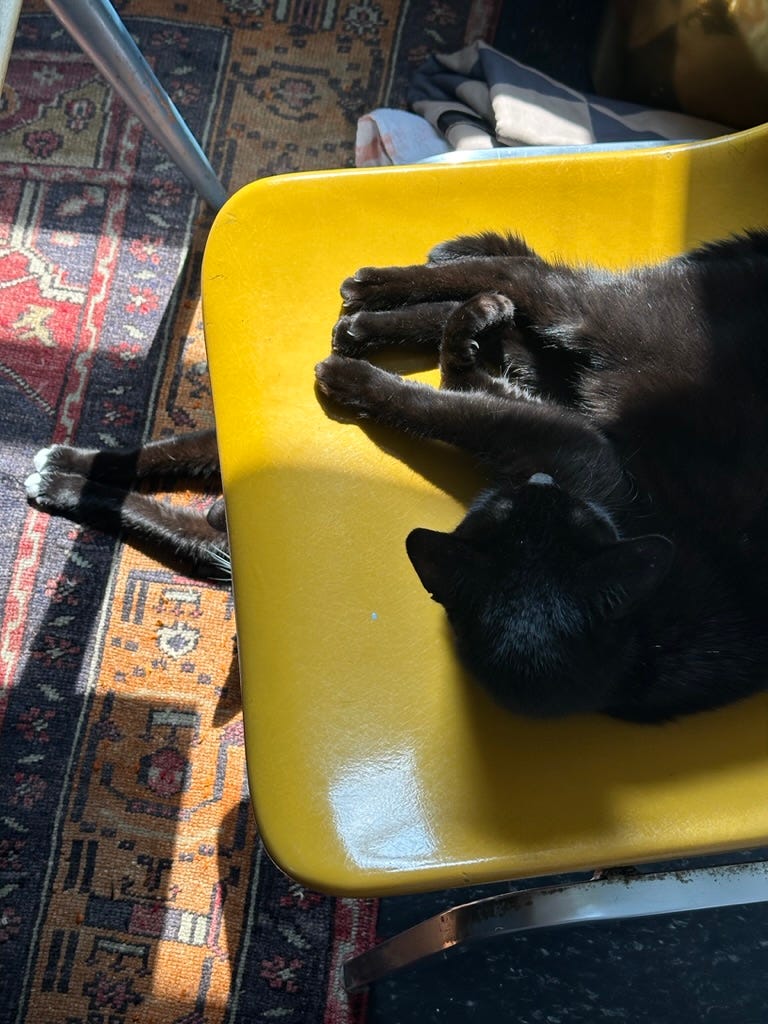Tired
This is Western Coffee—notes on building the creative body. Last time: Determination. The whole series is here. Please share this email; you can sign up free below.
Two hundred miles. That’s about how far I have left to run in the 60 days before the New York City Marathon. Some of these miles will be in races beside two different oceans, and some will be on a treadmill at the gym. Most will be on a familiar web that stretches over Brooklyn and Queens and Manhattan—my home turf, my terrain of first resort.
And going to the gym on Wednesday for my group swim workout, I felt tired. I’m used to that feeling arriving with brio at the end of the day, or even right after a really tough workout. But that day it’s the mode I woke up in and it’s the mode in which I arrived at swimming, where our instructor laid out a program heavy on freestyle kick—other than the butterfly stroke, my most obvious weakness, and the thing I enjoy least, and I realize as I’m writing this that part of the reason I dislike it so much is because it ties straight back to the athletic miseries of my youth. Swimming was an exception then to my feeling of humiliating incompetence in sport, but freestyle kicking was not. A hundred yards of it now is indistinguishable from a hundred yards of it then; they connect, Proustianly, and I’m somewhere in the middle of time, stranded halfway down the lane.
Nevertheless, I’m better now at noticing when I’m not the only one struggling, and my winded lanemates and I stretched out the 20-second rests between intervals, which mostly got easier as we warmed up and felt our way into the awkward mechanics of the drills written out in dry-erase across the mirror wall. At the end of class, a faster swimmer said he’d seen me practicing earlier in the week and that my stroke had improved notably of late, “especially the arms”; I pointed to our coach, Ester, and said, “Thank you. It’s because she’s a great teacher.” And she is: In a single conversation earlier this summer she fixed my attack. It’s worth being tired, before and after, to get what I do during that hour.
On the eve of the swim I worked as hard in cycling class as I have since the era when an Olympic rower habitually demolished me, despite some of the wildest fight I’ve ever called up. When you race, your vascular system dilates but your consciousness narrows. The floor of it rises and the ceiling drops and in the thin band remaining are just the emotions that would form into words if there were room, but there’s not. Nothing else, for me, edits down experience in this way—to an awareness that is condensed, not diluted, by the absence of words. That rival has moved on, and last night I was unrecovered from a nine-mile run earlier. But from the music that my teacher David chose came the essence, race; from the history and conditioning in the room. I made no conscious choices about it, just went as fast as my body knew how to go.
Tired lives in relationship to both endurance and the all-out; but it’s not just a consequence of either. When I worked at the Gap in high school we once had a whole wall of piqué polo shirts in dozens of colors, and I remember a manager explaining to me about merchandising—that some of the colors no one bought were there to enforce the composition of the whole. (This still seems dumb to me, but that’s what she said.) Tired is not the opposite of Zone 5 effort; they’re both just colors. The tired color is in greater evidence these days and I don’t reckon it’ll fade much between now and November 5, when 50,000 runners gather at Fort Wadsworth on Staten Island and take off for Central Park.
If you enjoy Western Coffee, please make a donation on my fundraising page for the nonprofit Achilles International, which is how I’m gaining entry to the New York City Marathon this year—my first. All donations go to the nonprofit and its work with disabled athletes; I’m paying my own race fees, etc.

